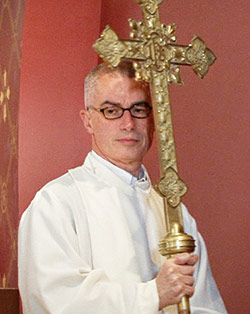
“You are looking beautiful, you precious child of God!” says Jim McGreevey to the woman who’s buzzed us into the rather institutional reception area of the General Theological Seminary on West 21st Street. The spectacularly former governor of New Jersey—who quit in 2004 over what he termed his “shamefully” having an affair with a man, after proudly declaring himself a “gay American”—spent three years of his post-governorship studying to become an Episcopal priest, part of his journey of penance and self-discovery. Or, more precisely, recovery, in the 12-step sense—he first went away to rehab in Arizona, not for substance abuse but for his addiction to acclaim, and wrote a tell-all book about his problem called The Confession. Of course, he went on Oprah to talk about it.
I’m with him today because Alexandra Pelosi, who specializes in making documentaries about “broken men,” made one about this one, called Fall to Grace, that HBO will air on March 28. Pelosi approached McGreevey and his partner, money manager Mark O’Donnell, three years ago, having followed the story in the tabloids—the coming out, the so-far unfulfilled bid for priesthood, the ugly divorce where his wife accused him of “fraud.”
“Alexandra was relentless. She sent me a card with some witty script across the face of it,” McGreevey tells me. They turned her down, he says, but they became friends. “Then she started showing up.” McGreevey invited her to his house for a party, then to see his work with Integrity House, where he counsels women in prison and helps them rebuild their lives when they get out. It’s become a second calling to him, helping others get over the mistakes of their lives. Impressed with his dedication—he’s visited the prison on holidays, sought out the women when they disappeared, used his connections to get them jobs—Pelosi started bringing her $500 handheld camcorder along, never quite coming out with her intentions. Two years later, her semi-on-the-DL documentary got into Sundance, and Pelosi had to persuade everyone to sign releases. O’Donnell refused. “Mark is not thrilled with the movie at all,” says McGreevey.
McGreevey has always been burdened, in a way, by his agreeableness: As a politician, he was known for almost never saying no (even if he had to lie). It’s been this way since he was a child: People like him, he likes people, and, most important he likes being liked by people. This was apparently a response to his learning, at around 7, that gay people were, according to the Catholic Church in which he was raised, evil—it made him eager to please and dedicated to honing his narrative of likability. He became a popular mayor, was elected governor with a young, pregnant wife, and could be quite scrupulous in giving his donors what they felt they deserved. He’s no longer vying for office, but he’s still the same puppyish, sincere, and enthralled man. If he had a tail, it would wag—down, boy! Everywhere he goes, he’s greeted with calls of “Jim!”
“Take care, my queen!” he says to the woman who buzzed us in as we exit into the muddy churchyard—parts of the seminary are being converted into luxury condos, so there’s construction all over—and walk to the old chapel, where he dips his fingers into the holy-water cistern and points out “rock-and-roll Jesus” in a stained-glass window. He’s on what Pelosi calls, with carny wryness, “the McGreevey Redemption Tour.” But like any good addict in recovery, McGreevey is wary of his motives. “This can’t be about me or my false idols: ego, notoriety,” he says. “It’s about the women and the need to change the prison system. It’s all too easy to ignore these women, as I did as governor.”
Pelosi tells me the lesson of the documentary is “Don’t let the worst thing you did define who you are now. Think of it as Tony Robbins for the HBO-documentary set.” I ask her if she worries that she is essentially enabling McGreevey’s need for attention, and she admits that the idea “does keep her up at nights.” She’s careful to add, “He used to be hooked on politics, and now he’s hooked on prisons.”
McGreevey told me that I’d like Pelosi—“She’s a hoot!”—and he’s right. The daughter of the House minority leader, she’s her own kind of deflected narcissist, of the disarming-blizzard-of-self-disclosure variety, and she spends the first twenty minutes on the phone with me in a rambling monologue about HBO’s stiflingly corporate offices; the fire drill they were having, which she was trying to ignore (“So don’t take it personally if I hang up on you”); and the fact that her family’s Tribeca apartment was flooded out by Sandy—before segueing to Sheryl Sandberg. One of the great moments in Fall to Grace is when she asks McGreevey: “What was worse—having to be heterosexual or being a politician?” I mention that, for many public figures seemingly wired to sell themselves, like McGreevey and not so much like her mother, performing probably feels completely natural. Pelosi tells the story of sitting with McGreevey at an IHOP down the street from the prison where he works as a counselor, and where he’ll often take former prisoners for Sunday breakfasts. “He talks to everyone in the restaurant,” she says. “When my mother comes to town and we go out to eat, if someone comes up to talk to her or get a picture, we give them the evil eye. There are just different kinds of politicians. He’s the ‘every single person I see is a vote I could be getting’ type. He has a disease.” (And at the premiere, when Congressman Sean Patrick Maloney suggested McGreevey get back into politics, Pelosi wailed, “Nooo.”)

“Every day, we decide whether we’re going to satiate the ego or accept the brokenness of who we are,” says McGreevey.
After we leave the chapel, I follow McGreevey down the path to the library. And we come upon—the librarian! Love her! And while it’s mutual, she does stop him to say he still owes a copy of a book (The God of Faith and Reason). “I can’t believe she remembered that,” he says. Retreating to the fancy French pastry shop on the corner, we discuss the paperback he’s got with him, The Perennial Philosophy, Aldous Huxley’s cross-cultural study of the meaning of the sacred, until he spots the school’s chaplain walking by and bangs on the window—“One of my dearest friends!”—inviting him in.
While in law school, McGreevey says, he considered the priesthood, but the Jesuits “told me no,” saying it was clear he was not yet ready to surrender his will to God. “After I resigned,” he says, a friend told him to “look at this as a gift. ‘If you could do anything in your life, what would you do?’ ” At General, a dean suggested he work with people just out of prison. “I began to listen to their stories and hear the horrific circumstances of their lives, how they were abused. And I began to realize how there is such a great commonality in human experience.” He sees himself in the women: “We are no different,” he says. “I was a drug addict and a criminal,” one woman tells him in the documentary. “I’m gay and stepped down as governor,” McGreevey responds. “Okay, you win,” she says.
“For many of these women, their lives have had not much of the sacred,” he tells me. “Their lives have been profane, violent, ugly, and brutal. I have the women say, every day, ‘I am a precious and valuable child of God.’ To try to rekindle the sense of their integral worth as part of creation.”
Have good intel? Send tips to intel@nymag.com.